When it comes to keeping our vehicles in pristine condition, one of the key considerations for any car owner is the cost associated with maintaining and enhancing the appearance of their automobile. One significant aspect of this maintenance is the expense incurred for car paint.
Whether you’re looking to touch up a few scratches, completely change the color of your vehicle, or simply protect the existing paint job, understanding “How much does it cost for car paint?” is essential. In this article, we will explore the various factors that influence the cost of car paint services, allowing you to make informed decisions about the investment required to keep your car looking its best.
The Importance of Car Paint
Car paint is not just about aesthetics; it plays a vital role in protecting your vehicle. Beyond making your car look shiny and sleek, it serves as a protective shield against the elements. The right paint job guards your car’s body against rust, corrosion, and the wear and tear of daily driving. It’s like the first line of defense for your vehicle’s longevity, making it a crucial aspect of car maintenance.
The color and finish of your car paint contribute to its resale value and overall visual appeal. Whether you’re a car enthusiast looking to turn heads or a practical driver aiming to preserve your vehicle’s worth, car paint is undeniably significant.
Factors Influencing Car Paint Cost
Understanding what goes into the cost of car paint can help you make informed decisions. Multiple factors influence the pricing of a paint job, such as the type of paint used, the quality of materials, and the extent of customization. Equally important are the size and condition of your vehicle, as larger or more damaged cars often require more effort and resources.
Furthermore, the choice between a do-it-yourself (DIY) paint job and a professional one has a substantial impact on the cost. Professionals bring expertise and specialized equipment, which can affect the price considerably.
Ultimately, the location of the service provider and regional differences in labor costs can also influence how much you’ll pay for your car’s paint job. By delving into these factors, you’ll be better equipped to make a cost-effective and satisfying choice for your vehicle’s appearance and protection.
Types of Car Paint
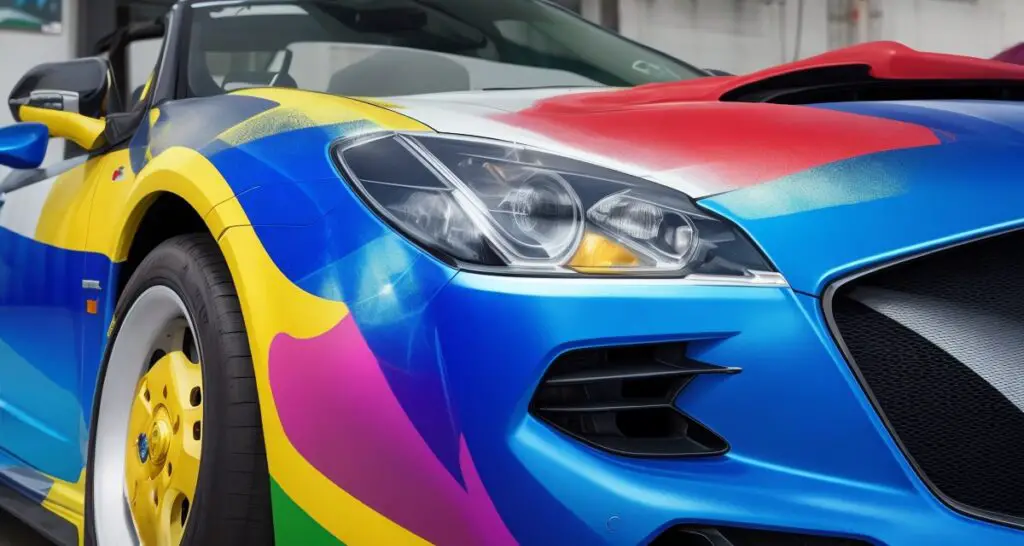
Overview of Different Paint Types
When it comes to car paint, a diverse range of options exists to cater to different preferences and needs. Understanding the various paint types is crucial in making an informed decision about your vehicle’s appearance. Some of the most common paint types include:
1. Enamel Paint:
Known for its durability and glossy finish, enamel paint is oil-based and highly resistant to damage from the elements. However, it takes longer to dry, and touch-ups can be challenging.
2. Urethane Paint:
Urethane paint is a popular choice due to its excellent durability and resistance to fading. It’s relatively easy to apply and dries relatively quickly. This makes it a top choice for many car owners.
3. Water-Based Paint:
Water-based paints are environmentally friendly and produce fewer fumes. They are gaining popularity for their reduced environmental impact. However, they may not be as long-lasting as some other options.
4. Acrylic Lacquer:
Acrylic lacquer paint offers a high-gloss finish and is easy to repair and maintain. It’s a classic choice for vintage and classic cars. However, it’s not as durable as some modern alternatives.
5. Metallic and Pearl Finishes:
These finishes add depth and shine to your vehicle’s appearance. Metallic paints contain small metal flakes, while pearl finishes have pearlescent additives, creating a unique, shimmering effect.
Pros and Cons of Each Paint Type
1. Enamel Paint:
The durability of enamel paint makes it an excellent choice for rugged vehicles or those exposed to harsh weather conditions. However, the longer drying time can be a drawback.
2. Urethane Paint:
Urethane paint is renowned for its resilience, making it ideal for daily drivers. It dries faster than enamel but can still be somewhat challenging to touch up.
3. Water-Based Paint:
Environmentally conscious consumers may opt for water-based paint, but they should be aware that it may not be as long-lasting as other options.
4. Acrylic Lacquer:
Acrylic lacquer is perfect for classic car enthusiasts. It offers a high-gloss finish but may require more frequent maintenance and repairs.
5. Metallic and Pearl Finishes: These finishes provide a unique and eye-catching appearance. However, they can be more challenging to repair if damaged. Careful consideration is essential when choosing a paint type that suits your car’s aesthetic and lifestyle needs. Each type has its distinct advantages and disadvantages, so making an informed choice will ensure your vehicle looks great and stays protected for years to come.
Cost of DIY Car Painting
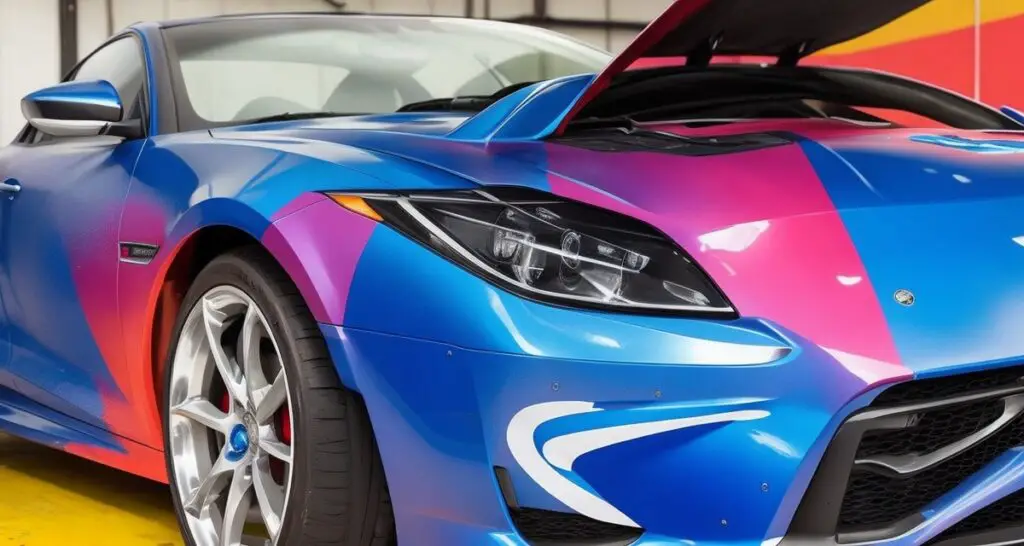
DIY Painting Options
Embarking on a do-it-yourself (DIY) car painting project can be a satisfying endeavor, but it’s essential to understand your options and costs. DIY enthusiasts have two primary options:
1. Spray Cans:
If you’re tackling a small touch-up job or aiming for a basic color change, spray cans are an economical choice. They offer convenience and are readily available in automotive stores and online. Keep in mind that spray cans are suitable for minor repairs, but for comprehensive paint jobs, you might want to explore other alternatives.
2. Paint Kits:
For more extensive DIY projects, paint kits are the go-to solution. These kits often include a larger quantity of paint, necessary equipment, and detailed instructions. While they may cost more than spray cans upfront, they provide a more comprehensive and professional approach to painting your vehicle.
Estimated Cost of Paint Kits
1. Spray Cans:
Typically, spray cans for car paint cost anywhere from $20 to $100, depending on the brand, color, and quality. Some high-end, specialty spray paints can be even more expensive. If you’re working on a small area or minor touch-ups, a spray can might suffice.
2. Paint Kits:
Full paint kits, on the other hand, are more comprehensive and typically range from $100 to $500 or more. The price depends on factors such as the size of the kit, the quality of the paint, and any Components included. Quality kits often come with a clear coat and primer, which contribute to the longevity and finish of the paint job.
Additional Supplies Required
1. Primers:
To ensure proper adhesion of the paint and a smooth, even finish, you’ll need primer. Automotive primers can cost between $10 and $30, depending on the brand and quality. Using the right primer is crucial for a lasting paint job.
2. Clear Coats:
Clear coats provide protection to your paint and add a glossy finish. They typically cost around $20 to $40. Quality clear coats are essential for a professional-looking and durable result.
3. Sandpaper and Prep Materials:
Don’t overlook the importance of proper preparation. Sandpaper, masking tape, and other prep materials are relatively affordable, with an estimated cost of $10 to $30. Ensuring a well-prepped surface is vital for a smooth and even paint application.
Understanding the costs associated with DIY car painting, as well as the different options available, is critical for a successful project. By choosing the right painting method and gathering the necessary supplies, you can achieve a satisfying and cost-effective result.
Professional Car Painting
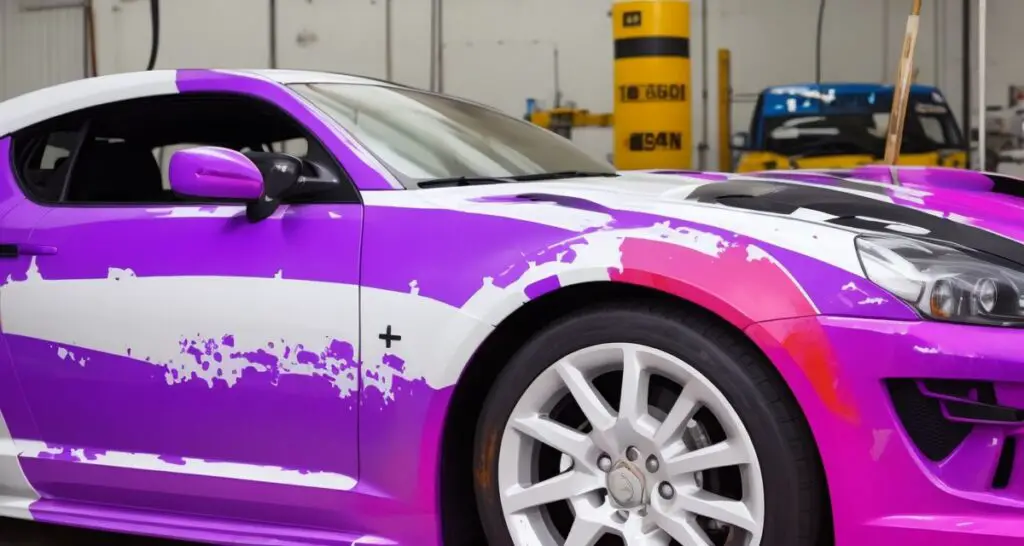
Benefits of Professional Painting
Opting for professional car painting offers a plethora of benefits that extend beyond just a fresh coat of paint. Here’s a closer look at why professional painting is a compelling choice:
Professional Expertise:
Auto body shops employ experienced technicians who understand the intricacies of car paint. Their expertise ensures a high-quality, long-lasting finish that’s challenging to achieve with DIY methods.
State-of-the-Art Equipment:
Professional auto body shops invest in advanced painting equipment, including spray booths, to create a controlled environment that minimizes dust and contaminants. This results in a flawless paint job.
Customization and Precision:
Professionals can provide custom paintwork, from intricate designs to specialty finishes. They have the tools and skills to make your car truly unique and reflective of your style.
Warranty and Quality Assurance:
Reputable shops often offer warranties on their work, giving you peace of mind that any issues will be addressed promptly. This level of assurance is rarely available with DIY projects.
Time Savings:
Professional painting is more efficient. It minimizes downtime and ensures a faster turnaround, allowing you to get back on the road quickly.
Factors Influencing Professional Paint Job Costs
The cost of a professional car paint job can vary widely due to several key factors:
1. Auto Body Shop Reputation:
The reputation of the auto body shop plays a significant role in pricing. Well-established and highly regarded shops may charge more for their expertise and quality.
2. Location:
Geographic location affects costs. Auto body shops in urban areas or regions with a high cost of living may charge more for their services than those in rural areas.
3. Quality of Paint Used:
The type and quality of paint can impact the price. High-end, durable paints may come with a higher price tag, but they ensure a longer-lasting finish.
4. Size of the Vehicle:
Larger vehicles like trucks and SUVs require more paint and labor, resulting in a higher cost. Size directly influences the amount of materials and time needed.
5. Customization and Detailing:
If you desire intricate designs, specialty finishes, or detailed customization, be prepared to pay more. Artistic and specialized work demands Time and resources.
Understanding these cost-influencing factors will help you make an informed decision about your professional car painting project. By considering the benefits of professional painting and the variables affecting pricing, you can strike a balance between quality and your budget, ensuring a stunning and long-lasting result.
Average Cost of a Basic Professional Paint Job
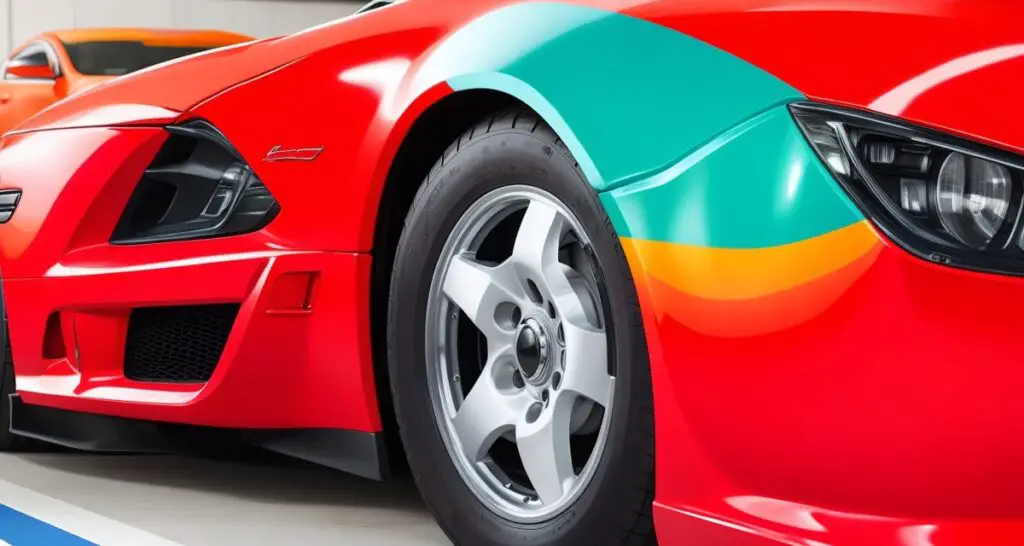
Cost Range for a Single Color Paint Job
The cost of a basic professional paint job for your car can vary significantly depending on several factors, with one of the most critical being the choice of color. A single color paint job typically ranges from $500 to $3,000 or more. While this wide cost spectrum might seem daunting, it’s important to understand what influences these price variations.
The cost range primarily depends on the type of paint you select. Basic, solid colors tend to be on the lower end of the spectrum, while custom or specialty colors often drive the price higher. The size of your vehicle also plays a role, with larger cars, trucks, or SUVs costing more due to the increased amount of paint and labor required. Furthermore, your location can impact costs, as auto body shops in urban areas tend to charge more than those in rural regions.
What’s Included in the Cost
How Much Does It Cost For Car Paint?
When you pay for a professional paint job, you’re not merely investing in a new coat of paint. The cost typically includes several components to ensure a quality finish. This package generally consists of surface preparation, which involves cleaning, sanding, and priming the car’s surface to ensure proper adhesion. It also includes the paint itself, labor costs for the actual painting process, and a clear coat to protect the paint and provide that glossy finish.
Many reputable auto body shops may include a warranty or guarantee as part of the cost. This ensures that if any issues arise after the paint job, such as peeling or fading, they will address them without Charges.
Examples of Typical Price Ranges
To give you a better idea of what to expect, consider some typical price ranges:
1. Small to Midsize Cars:
Basic single color paint jobs for small to mid-sized cars often fall in the $500 to $1,500 range.
2. Larger Vehicles:
Larger vehicles, like trucks or SUVs, can range from $1,000 to $3,000 or more due to the increased surface area.
3. Specialty Paint:
If you desire a specialty paint color or finish, such as metallic or pearl, prices can significantly exceed the above ranges.
4. Auto Body Shop Reputation:
High-end shops with an excellent reputation may charge more for their expertise and quality.
By understanding these cost factors and considering what’s included in a professional paint job, you can make a well-informed decision and negotiate with auto body shops to get the best value for your investment.
Additional Costs
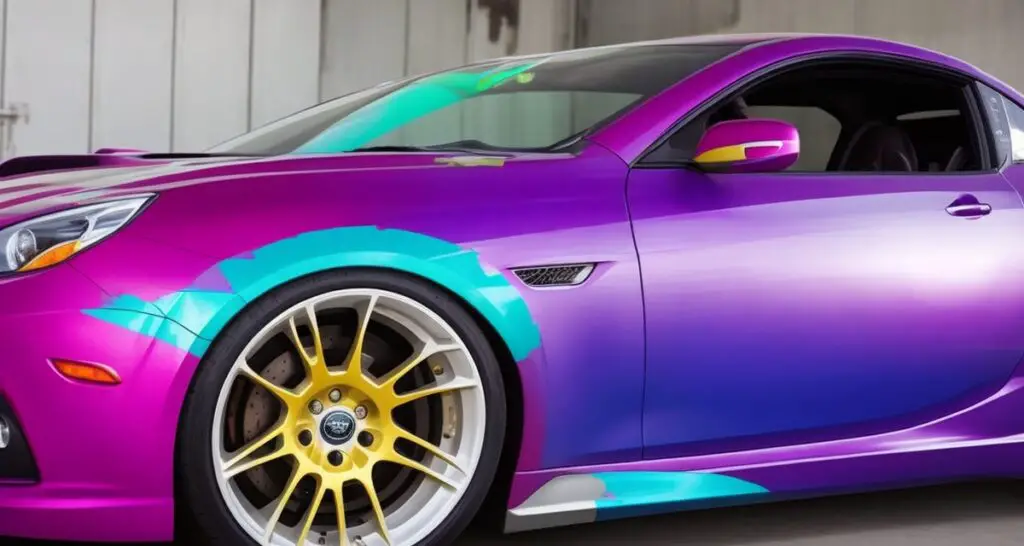
Bodywork and Repair Before Painting
1. Fixing Dents and Scratches
Before a professional paint job, it’s often necessary to address any existing dents and scratches on your car’s surface. Repairing minor dents can cost around $50 to $150 per dent, while more extensive damage may require a dent removal specialist, which can cost between $100 and $300. Fixing scratches typically ranges from $50 to $350, depending on the depth and extent of the damage. These costs are in To the paint job itself but are essential for achieving a flawless finish.
2. Addressing Rust or Corrosion
If your car has rust or corrosion issues, they must be resolved before painting. The cost of addressing rust can vary widely, from a few hundred dollars for minor surface rust to several thousand dollars for extensive rust damage that requires panel replacement. The price depends on the severity of the rust and the extent of the repair needed. Ignoring rust can lead to more significant problems down the road and compromise the quality of your paint job.
Custom Designs and Specialty Finishes
1. Airbrushing and Graphics
For those looking to make a statement with their car’s appearance, custom designs, airbrushing, and graphics are popular choices. Airbrushing and intricate graphics can be quite costly, with prices ranging from $500 to several thousand dollars. The price depends on the complexity of the design, the skill of the artist, and the materials used. While it’s a significant Expense, it can transform your vehicle into a unique work of art.
2. Matte or Metallic Finishes
Matte and metallic finishes have gained popularity for their distinct appearance. These specialty finishes can add $1,000 to $3,000 or more to the cost of your paint job. The unique materials and techniques required to achieve these finishes contribute to the higher price. The result, however, is a head-turning look that sets your car apart.
Cost Factors for Larger Vehicles (e.g., Trucks and SUVs)
The size of your vehicle directly impacts the cost of both bodywork and painting. Larger vehicles, such as trucks and SUVs, have more surface area, which requires more paint and labor. As a result, you can expect to pay anywhere from 50% to 100% more for a paint job on a larger vehicle compared to a standard-sized car. The added cost is primarily due to the increased materials and time needed to complete the job. It’s essential to consider these factors when budgeting for a paint job on a larger vehicle, as they can significantly influence the overall cost.
Understanding these Cost factors allows you to plan your car painting project more accurately, ensuring that you address any necessary repairs, choose the right design or finish, and budget accordingly for larger vehicles.
Quality of Paint and Its Impact on Cost
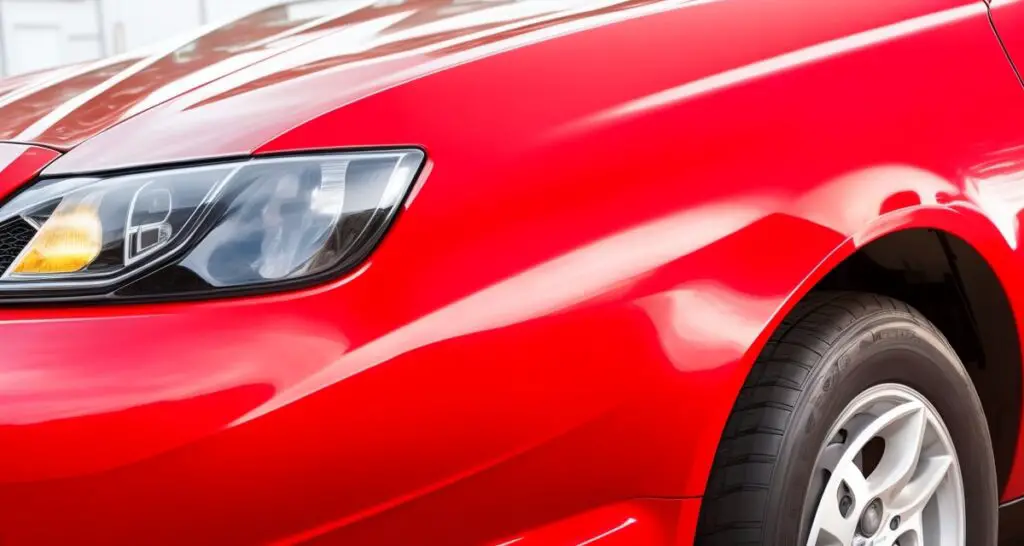
Paint Quality and Durability
The quality of paint used for your car can significantly affect the longevity and overall cost of your paint job. Paint quality goes beyond just appearance; it plays a critical role in protecting your vehicle’s surface. Here’s why paint quality matters:
Durability: High-quality paints are engineered to withstand the elements, such as UV rays, moisture, and temperature fluctuations. This durability results in a longer-lasting and more resilient finish that resists chipping, fading, and deterioration.
Resistance to Damage: Premium paints provide a level of protection against minor scratches and abrasions. This means your car’s surface will maintain its pristine appearance for an extended period, reducing the need for frequent touch-ups and repaints.
Gloss and Finish: Quality paints produce a superior gloss and finish, contributing to a more visually appealing and professional-looking paint job.
How Premium Paints Affect the Price
While premium paints offer several advantages, they can be a more substantial investment compared to lower-quality options. The price of premium paints can vary, but several factors influence the cost:
Brand and Manufacturer: Established and renowned paint brands often charge more for their products due to their reputation for quality and reliability.
Type of Paint: Specialty paints, such as metallic, pearl, or custom colors, typically cost more than basic solid colors.
Coverage and Layers: Premium paints often require fewer coats to achieve the desired finish, potentially reducing labor costs. However, the initial price of the paint may be higher.
Benefits of Investing in High-Quality Paint
Investing in high-quality paint for your car is a wise decision for several reasons:
Longevity:
A top-quality paint job can last significantly longer, meaning you won’t need to repaint your vehicle as frequently, ultimately saving you money in the long run.
Appearance:
The enhanced appearance and finish of premium paint contribute to your car’s aesthetics, increasing its overall value and curb appeal.
Protection:
Quality paint provides better protection against environmental factors, helping prevent damage to your vehicle’s surface.
Reduced Maintenance:
With premium paint, you’ll experience fewer touch-ups and maintenance, reducing your overall expenses and ensuring your car maintains its polished appearance.
Getting Multiple Quotes
Importance of Getting Quotes from Different Auto Body Shops
Obtaining multiple quotes for your car paint job is a fundamental step in ensuring a successful and cost-effective project. Here’s why it’s essential:
1. Cost Variability:
Auto body shops can have substantial differences in pricing for the same service. Getting multiple quotes allows you to gauge the average cost, helping you avoid overpaying.
2. Quality Assessment:
Beyond price, quotes provide an opportunity to assess the quality of the service each shop offers. The reputation, experience, and professionalism of a shop can be inferred from their quote and interaction.
3. Negotiation Power:
Armed with multiple quotes, you have a stronger position to negotiate a fair price. You can also use competing quotes as leverage to persuade a shop to match or beat a competitor’s offer.
4. Services Included:
Quotes reveal the services included in the price. Comparing these details helps you identify shops that offer a comprehensive package, such as Services like dent repair or detailing.
What to Consider When Comparing Quotes
When comparing quotes, consider the following factors:
1. Detailed Breakdown:
Ensure each quote provides a detailed breakdown of costs, including paint type, labor, materials, and any Services.
2. Warranty or Guarantee:
Inquire about any warranties or guarantees offered by the shop. A longer warranty can provide peace of mind and save you money on potential future issues.
3. Timeline:
Check the estimated completion time for the project. Timely completion is crucial if you rely on your vehicle daily.
4. Reputation and Reviews:
Research the reputation and customer reviews of each auto body shop. Positive feedback from previous customers can be a significant indicator of the shop’s reliability.
5. Communication and Transparency:
Evaluate the shop’s communication and transparency. A shop that readily answers your questions and provides clear information is more likely to offer a hassle-free experience.
Questions to Ask When Seeking Estimates
When seeking estimates, ask these essential questions:
1. What is included in the estimate, and are there any potential Charges?
2. Can the shop provide references or examples of their previous work?
3. Is the paint job covered by a warranty or guarantee, and what does it entail?
4. What type and brand of paint will be used for the job, and can you choose the paint quality?
5. What is the shop’s policy regarding any issues or defects that may arise after the paint job is completed?
By gathering multiple quotes and thoroughly comparing them while asking relevant questions, you can make an informed decision that not only saves you money but ensures the quality and reliability of your car’s paint job.
Location and Cost
Regional Differences in Car Paint Costs
The cost of car paint can fluctuate significantly based on your geographical location. Regional disparities play a substantial role in determining the price of a car paint job. Here’s why:
1. Economic Variances:
Different regions have varying economic conditions, which directly impact the cost of services. Urban areas with higher living costs tend to charge more for car painting compared to rural or less densely populated regions.
2. Supply and Demand:
In areas with a high demand for automotive services, auto body shops might charge a premium due to the sheer volume of customers. In contrast, less competitive markets may offer more competitive pricing.
3. Taxes and Regulations:
Local taxes and regulations can influence pricing. Certain areas may have higher taxes or stricter environmental regulations, resulting Costs for shops that they may pass on to customers.
4. Transportation Costs:
If a shop is located in an area with high transportation or real estate costs, it can affect their overall operating expenses, which may be reflected in the price of their services.
How Local Labor Rates and Cost of Living Affect Pricing
Local labor rates and the cost of living significantly impact the pricing of car paint jobs. Here’s a closer look:
1. Labor Costs:
Labor is a major component of the overall cost of a paint job. Regions with higher average labor rates typically charge more for auto body work. Skilled technicians in areas with a higher cost of living often demand higher wages.
2. Rent and Overhead:
The cost of renting or owning a business property varies by location. Areas with higher rent or overhead costs tend to pass these expenses on to customers.
3. Competitive Factors:
The level of competition among auto body shops in a region can also influence pricing. In areas with numerous shops vying for customers, prices may be more competitive.
4. Local Economy:
The general economic health of a region plays a vital role. Stronger local economies can lead to increased consumer spending, which may allow businesses to charge higher prices for their services.
Understanding how location and local factors impact car paint costs is crucial for making budget-conscious decisions. Consider seeking quotes from different regions if feasible, as it may be worthwhile to travel a bit to find a better deal without compromising quality. Remember that the cost of a paint job is not only about the service itself but also about where and how it is performed.
DIY vs. Professional: Making the Right Choice
Pros and Cons of Painting Your Car Yourself
Taking on a do-it-yourself (DIY) car painting project can be a rewarding endeavor, but it’s essential to weigh the pros and cons before deciding:
Pros:
1. Cost Savings:
DIY painting is typically more budget-friendly, especially if you already have some of the required tools and materials.
2. Hands-On Experience:
It’s a chance to get hands-on and connect with your vehicle while gaining a sense of accomplishment.
3. Customization:
DIY allows for personalized touches and artistic expression, enabling unique paint jobs and designs.
Cons:
1. Skill Requirement:
Achieving a professional finish demands skill and experience. DIY projects may not result in the same level of quality as a professional job.
2. Time-Consuming:
Car painting is time-consuming, and DIY projects often require longer hours, which can be impractical for those with busy schedules.
3. Risk of Mistakes:
Errors in DIY painting, such as uneven coats or drips, can be costly to rectify.
When It’s Advisable to Hire a Professional
While DIY projects offer certain advantages, there are situations where hiring a professional is a wiser choice:
1. Complex Repairs:
If your vehicle needs extensive bodywork, like dent removal or rust repair, professionals can seamlessly integrate these repairs into the painting process.
2. Specialty Finishes:
Achieving intricate designs, metallic or pearl finishes, or other specialty options often requires professional skills and equipment.
3. Resale Value:
If you plan to sell your car, a professional paint job can increase its resale value and appeal to potential buyers.
4. Warranty and Quality:
Auto body shops often provide warranties, ensuring that any issues post-painting are promptly addressed. This assurance is rarely available in DIY projects.
Budget Considerations
When deciding between DIY and professional painting, budget considerations are crucial:
1. DIY Budget:
Consider the cost of paint, materials, and tools. Factor in any Expenses, such as repairs or customizations. DIY is often less expensive upfront, but quality may vary.
2. Professional Budget:
Get quotes from multiple auto body shops to understand the costs involved. Factor in the size of your vehicle, paint quality, and Services. Professional jobs can be more expensive but offer guaranteed quality.
Ultimately, your choice between DIY and professional car painting should align with your skill level, time availability, and budget. It’s vital to assess the complexity of the project and the desired outcome, ensuring your decision meets your goals while preserving the beauty and value of your vehicle.
Preserving Your Car’s Paint Elegantly
Gentle Tips for Prolonging the Beauty of Your Car’s Paint
Caring for your car’s paint is an art that involves regular attention and tenderness. Here are some graceful tips to protect and enhance the life of your car’s paint:
1. Cleansing Ritual:
Regularly cleansing your car washes away dirt, grime, and contaminants that may threaten the paint’s radiance. Use a pH-balanced car shampoo along with a velvety, non-abrasive sponge or a delicate microfiber cloth to bestow your vehicle with a caressing touch.
2. Scratch Avoidance:
Bestow gentle care during your cleansing rituals and shun harsh scrubbing or the use of abrasive tools. Similarly, abstain from automated car washes bearing abrasive brushes.
3. Wax’s Embrace:
Every few months, gift your car the tender caress of high-quality car wax. This embrace creates a shield, shielding the paint from the influences of the environment, including the caress of UV rays and the whispered secrets of pollutants.
4. Shady Retreats:
Whenever you can, seek shelter for your car in the embrace of shade or within a nurturing garage. Extensive exposure to the sun’s ardor may lead to the paint’s fading and withering.
5. Guard Against Avian Blessings and Arboreal Gifts:
Swiftly remove avian blessings and arboreal gifts as they carry elements of acidity that may harm the paint’s serenity. Employ a soft fabric or a tenderly crafted detailing spray for a gentle exorcism.
6. No Harsh Elixirs:
Abstain from deploying harsh chemicals or household concoctions upon your car’s paint, as they may strip away the protective layers and blemish its complexion.
7. Routine Assessment:
At gentle intervals, bestow upon your car the gift of a routine inspection. Seek any traces of chips, scratches, or signs of distress, and address them lovingly to prevent them from taking root.
The Graceful Significance of Regular Maintenance
Regular maintenance of your car’s paint is a graceful gesture for several reasons:
1. Safeguarding Beauty:
Proper care bestows a timeless beauty upon your car’s paint, preserving its youthful allure for years.
2. Shielding Elegance:
A well-maintained paint job is like a guardian, sheltering your cherished vehicle from the elements’ whispers, the sun’s caress, and the subtle advances of contaminants.
3. Value in Elegance:
The elegance of well-maintained paint endows your car with a higher resale value. It communicates the tale of a car that has been cherished and safeguarded.
4. Elegance in Prudence:
By bestowing care with grace, you shield your car from minor distress that, left unchecked, could transform into costly and elaborate paint repairs.
C. Preserving Your Exquisite Investment
Your car is not merely a machine; it is an investment in elegance. Preserving its paint is a graceful act, signifying your dedication to its aesthetics and its enduring value. This refined protection against the elements and the gentle strokes of time not only enhances its beauty but also keeps your financial embrace intact, as you require fewer restorations and repaints. A well-preserved paint job is your signature of commitment to your vehicle’s elegance and enduring allure.
Conclusion
The cost of car paint varies widely, from as low as $50 for small DIY touch-ups to thousands of dollars for professional paint jobs. The final price depends on multiple factors, including the type of paint, the size and condition of the vehicle, regional pricing differences, and whether you choose to do it yourself or hire a professional.
Ultimately, the investment in your car’s paint job should align with your goals, budget, and the level of quality and customization you desire. Whether you opt for a budget-friendly DIY project or invest in a professional finish, proper care and maintenance will help ensure your car’s paint remains vibrant and protected, preserving both its aesthetics and value over time.
FAQS;
How much does a basic car paint job cost?
A basic single-color car paint job typically costs between $500 and $3,000, depending on factors like the type of paint, the size of the vehicle, and regional pricing differences.
What factors influence the cost of a car paint job?
Several factors impact the cost, including the type of paint used, the size and condition of the vehicle, the location of the auto body shop, and the extent of customization or repairs required.
How much does a professional car paint job cost on average?
The average cost of a professional car paint job can range from $1,000 to $5,000 or more, depending on the same factors mentioned earlier, along with the reputation of the auto body shop.
Is DIY car painting a more cost-effective option?
DIY car painting can be more budget-friendly, with costs ranging from $50 for small touch-up jobs to several hundred dollars for full DIY paint kits. However, it requires skill and may not achieve professional results.
Are there additional costs to consider in car painting?
Yes, there are costs like repairing dents and scratches, addressing rust or corrosion, custom designs, and specialty finishes. These can add to the overall expense.

